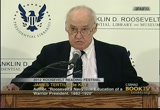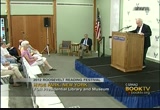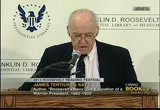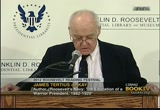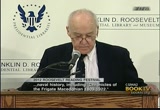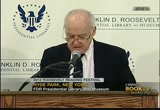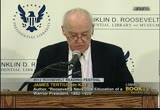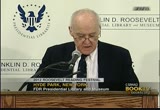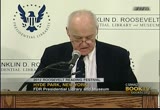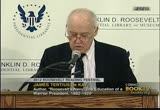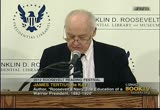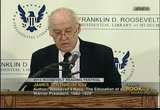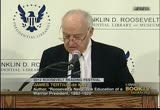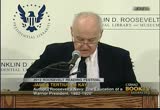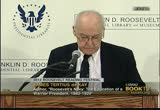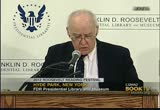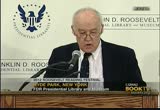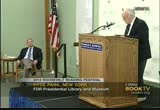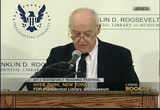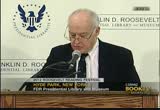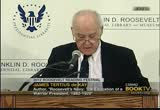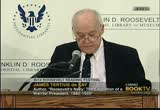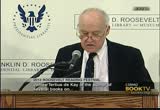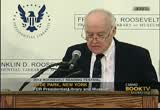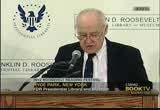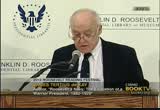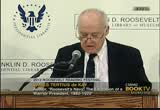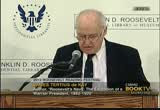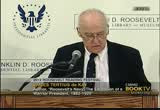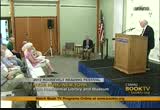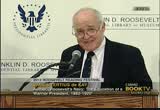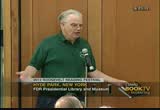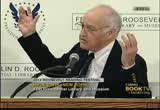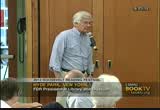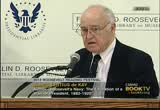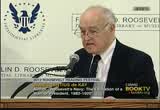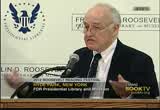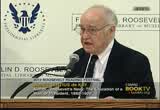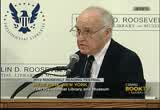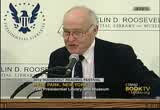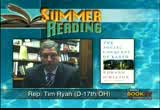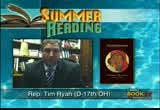tv Book TV CSPAN September 1, 2012 7:00pm-7:45pm EDT
7:00 pm
life crowded with so much manoush up. hundreds of thousands of shelf feet given over to zillions and zillions of telegrams, legal briefs, state papers, personal letters, schoolbook scribbles, speaker cables, children's drawings, warnings, threats, scraps and details of vitally important political landmarks and long forgotten grants teams that ran out of steam before they could he acted upon. i quickly discovered that there wasn't a whole lot about magdalena bay in the library. i wasn't that surprised. the crisis i was investigating have been more or less settled by the time franklin roosevelt arrived in washington in 1913 to take up his duties in the navy department. ..
7:02 pm
but it proved to me, it might hold something more interesting. >> his identification with the navy represented not just one of his interests but was, in fact, a very basic part of this character. a very real extent of, his entire intellectual world you around his understanding of the navy. he did not see the navy is part of his world view. he understood the world based on his view of the navy. that was an interesting idea. the case, his entire political career, especially his years in the white house as a reflection of his naval center quarrelled you. the new deal, foreign policy, his fights with congress and the
7:03 pm
supreme court, world war ii, his entire political career represented him inherently naval intelligence. so i began researching franklin d. roosevelt and ernest. eventually it resulted in this book. roosevelts navy, the education of the most powerful warrior president in american history. as is always the case with research, i came upon surprises. and deadly the biggest surprise to me was the more i looked into franklin roosevelt early years the more i kept bumping into another roosevelt, theodore roosevelt. and they quickly became evident to me that the influence of the roosevelt on the young franklin which was generally overlooked in most for accounts of his life was profound and far reaching and a half to play an important
7:04 pm
part in the story of fdr and the navy that i want to tell. but i get ahead of myself. the story begins, like most stories, at the beginning. i would like to of service chapter one. a boy sits alone quietly reading a book. elsewhere in the house the familiar sounds of servants going about their daily chores are punctuated now and then by the column authoritative voice of his mother or father supervising the activities. the boy is oblivious to everything except the book in his hands. the time is somewhere in the early 1890's. the boy is franklin delano roosevelt. he is about ten or 11 years old. the bookie is reading represents something of a challenge. it is filled with unfamiliar technical terms, complicated
7:05 pm
charts, and curious diagrams. but because he is also filled with combat and the smell of gunpowder, crowded with thrilling accounts of derring-do many age a fighting. so the board agrees that the focused intensity, totally lost. he is sitting in the library. his family's country home in the village of five park overlooking the hudson river about 70 miles north of new york city. cannot be precisely sure when we first wrote the book he is holding. we know that he read it at an early age, certainly before his teens and know that he had a powerful influence upon him throughout his life. it was almost certainly the single most important book you will ever read. the book captures his attention.
7:06 pm
entitle the naval war of 1812. from early childhood friend the has been fascinated with things maritime, an avid sailor. under his father's watch will tutelage he learned his and knocked about from iceboats and other small craft and served as crew on his father's 51-foot sailing vessel. during summers on the island where the family keeps a cottage but he is not the subject matter that has brought into the naval war of 1812 so much as the fact that the book is written by his distant cousin, theodore roosevelt. beyond -- young franklin doesn't greatly admires his fun-loving 35 year-old cousin who enjoys strenuous cares for children and to after a day of running and shouting likes nothing better than together everyone around the fire and tell them gripping
7:07 pm
tales of his adventures in the dakota territory. at this point in his life theodore has already made a considerable name for itself as a writer, but has not yet progressed as far as you would like his other shows an interest, politics. at the moment he is still a relatively obscure washington civil service to mission. still lies in the future. but to those who already know him, his dynamism and boisterous energy already the finest character. throughout his life franklin was referring to his cousin theodore with genuine off as the most wonderful man i ever knew. the book is filled with theodore's infectious patriotism and his delight in the exploits of the gallant and glamorous, doors and let america's early navy.
7:08 pm
but theodore roosevelt has not limited his narrative to heroes alone. woven into the celebration of their adventures are broader points on the strategic value of navies in general, under the unique role that they play in shaping and carrying out national policy. he explains how warships can reach across the globe to enforce the national resolve thousands of miles from home. the tiny american navy man's two and a way that they controlled. they embraced the enemy of the coast of africa and as far away as the waters of brazil. cousin ted points out that when navies are large enough to be organized into fleets they can wield a devastating power in combat, much as melson did at trafalgar the horror show of an enemy supply lines by blocking his coast.
7:09 pm
he makes it clear that navies are just as important in peacetime as they are more. on like armies which are apt to become expensive nuisances in time of peace, navy's continue to serve the nation long after the battles are over. properly deployed they can protect the country's foreign trade and their very existence will come to discourage an attack by any potential enemy. again and again cousin ted harris summed this basic message that navies are vital to of maritime nation's welfare and young franklin humbly and uncritically absorbs all. cousin ted's enthusiasm and his tightly organized arguments we will form the foundation for his personal philosophy and provide the board with a matrix with which to define the world around him. over the years to come frank and the roosevelt will read religiously that the one book, the naval war of 1812, will
7:10 pm
always remain a the singular importance to him. fifty years, fate and circumstance put him in command of the most powerful military force in history, it will be to his distance theodore that he returns for inspiration and guidance. and a dozen tents book will never be far away. it's lessons never ignored. throughout his years fdr kept two copies in his personal library. one for the white house, and the other for his boyhood home. franklin roosevelts education was that of a sheltered, provides child, a private teachers and governesses were imported to instruct him. because regulatory through europe, by the age of 12 he was a veteran of half a dozen atlantic crossings. more less flowing to in both
7:11 pm
french and german. but for all his travel and learning the importance deficiencies in his education with taken years to fully overcome. the most significant of these was the fact that he was taught almost as the soviet home. he did not actually go to school until he was 14. while academic lessons can be taught anywhere, some of the most important lessons in childhood can only be learned in the rough-and-tumble of school. such lessons include the complex and sometimes painful once involved with learning how to get along with one's peers. sometime humiliating competition in the classroom, rivalry for attention and good grades. cut and thrust of the schoolyard where students were sorted out in ways that are often unfair
7:12 pm
and undemocratic but always realistic. the problem of dealing with police, the agonizing and delicate compromises that must be learned in order to make friends and the further compromises needed to keep them. the bargaining, black ties and white lines required to hold your position in the crowd. these with a lifeless as the franklin roosevelt nest as a young boy and which would later take him tickets to master. although nearly spoiled, not pampered, his soda of life would lead him in a certain social disadvantage for many years. several years after we first read the history of the naval war of 1812 frank and at last about to school for the first time. significantly the school he went off to in massachusetts had been founded by a close friend of theodore roosevelt.
7:13 pm
deliberately models. the school was deliberately modeled on the great public schools of england. educated britons leaders for centuries. it proved to be so. but even here there is a problem the students, expected to return for six years, enrolling in his for a man aged 12 and continuing through the sixth forum at age 18. but franklin's mother could not bring herself to part with her only child so sent and held him back two years so he did not answer until the third form when his 14. unfortunately for him by that time all his classmates had long since established to the french ships,. >> , rivalries, and other social
7:14 pm
strategy's of adolescent males and young franklin was left an odd man out. steve found solace in studying the writings of captain alfred of the united states navy. probably one of the most influential and large it's forgotten military the interests of his state. one of the first strategist understand what we call geopolitics, the idea that nations and cultures are largely shaped by their geography and their ability to defend themselves or to attack others is governed primarily by their waterways. importantly, man was a close friend. he would count was station off the coast of peru. one day he is relaxing in the english slaver reading a book on
7:15 pm
the worst. he was hit by an important epiphany. all that business of hannibal crossing the alps with elephants to attack from was a large waste of time and money. if cartages have had a sufficient navy to defeat the room and navy there would have been no need to cross the straits of gibraltar campaign up through spain and crossed the pyrenees and the alps and finally down into italy because he could simply sale of the mediterranean attack from directly. inspired by his new understanding of navies and their importance he wrote a book called the influence of power on history which became a worldwide textbook for modern navies and deeply influenced young franklin roosevelt. just how deeply the influence can be seen in his notes. a formal debate was held on january 19th 1398. fdr was 15 years old.
7:16 pm
the subject of debate was resolved, that probably a mixed. the issue was very much in the news at the time. providing to such a step had been introduced in congress. the case was to be presented by the headmaster himself after which young roosevelts was to respond with their rebuttal. to put the subject into context, you do well to remember the issue was being discussed in a world in which there were plenty of empires but as yet no aircraft, no radio, no panama canal, a world in which kohl has not yet been replaced by oil for fuelling ships and the world in which a hundred million dollars was worth billions in today's currency.
7:17 pm
sixteen. okay. reading his nose today, it is abundantly evident that young franklin understood his subjects and truly remarkable depth. minister presented with uncommon clarity and conviction, demonstrating an impressive grasp of geopolitical issues, naval strategy, and relative national strength. the field just as sophisticated in and selectee was developing and how deeply cousin ted's naval precepts have helped define his own understanding of his country and the world. after his case had been presented his useful opponent began his rebuttals with a sweeping generalization that led his listeners to understand that the very subject was of global significance and immediately established a naval importance.
7:18 pm
this is the direct quote from franklin roosevelt's, his notes as a 15 year-old. of all the great powers of the world, the united states and russia are the only ones which have no colonies to defend. all our territory is on this continent, and all of it, except alaska, is continuous. therefore, the united states and russia are the only two countries no part of its territory can be cut off by an evil enemy. at present we have no really vulnerable points. no, the annexation of hawaii by us would affect the feelings of european powers into waste. first of you would-because hawaii is a, stopping point. secondly, it would embolden them because we should, for the first time in our history, the
7:19 pm
vulnerable points. mr. peabody has told us that our country cannot be safely double why. i shall try to disprove this. now, if we on the islands that means that we must protect them. to do that we should have to fortified the islands themselves but also maintain a much larger navy. now, to do this we should have to spend at least $100 million every year on our navy, besides a large sum maintaining soldiers on the island. well, it goes on from there. i have read enough to make clear that this is very sophisticated. the 15 year-old boy who can put together a position paper or the a presentation in a presidential cabinet meeting. around this time the young frank and announced that after graduation he wanted to apply to annapolis and pursue a career in the navy. his parents were distressed. they were not happy with the
7:20 pm
thought of their boy being sent to the far corners of europe for years at the time. it took all their efforts to persuade them and convince him he should go to harvard instead. those for the days when if you wanted to go to a harvard you went harvard. it's a little different now. so he went to harvard and then to columbia law school which she never finished because he quit school the minute he learned he passed the bar exam. only rarely that law students can pass the bar exam before they have earned their law degree. the fact that frank and manage to do so is further evidence that he was a very, very bright young man. the fact that he worked hard to describe the style he had acquired to make up for his lack of more relaxed self-confidence social behavior, he would lose much of that are proposed, but not all that. that voice, so would remain to
7:21 pm
the end. then he get married to another roosevelts, the doors favorite niece, eleanor. the merits transformed theaters relationship to fdr from cousin ted to ogle said. also significantly, of uncle ted by this time was president of the united states. here in this pause for a minute to examine briefly just how theodore roosevelt got to be president because it bears directly on franklin subsequent career. around the time that franklin was preparing his notes the door had been running the police department in new york city. having a grand time reading of corruption. the powers that be in the republican party decided he was becoming a nuisance. so they looked around for a job they could offer him to get him out of new york. someone remembered theodore had
7:22 pm
written a book about the war of 1812. interested in a job as assistant secretary of the navy? he jumped at the chance. only weeks after he was sworn in the spanish-american war broke out. the door immediately quit the navy department, created the rough riders, sailed to cuba and became a hero. then only months later he was elected governor of new york and a year after that vice-president . under mckinley, president. all happened almost as fast as i can recounted. needless to say, the young president took note of every step. which brings us back to franklin who, by this time, had joined the prestigious law street -- wall street law firm. led directly to a remarkable scene somewhere near the end africa's first year on wall street. on a particularly slow day at
7:23 pm
the office he and his fellow law clerks said there rolltop desk casually discussing their hopes and plans for the future. when it came has turned franco's surprised investors by stating clearly the war was out for him. he would, instead, with the opportunity provided self, go into politics and run for the new york state legislature. after an indeterminate stay in albany, he said, no bit of various points, he would somehow arrange to give himself appointed assistant secretary of the navy in washington. from there he would run for governor of new york and then he explained in reasonable terms, anyone who is governor of new york had a good chance to be present with any luck. of course it was not lost on any of his listeners that fdr was precisely the meteoric rise of the roosevelt, the most significant reaction on the part of his fellow law clerks to his
7:24 pm
amazing pronouncements was that it provoked bitter laughter ignored paris of hooting. they heard him out quietly and accepted at face value the entirely reasonable nature of his plan. even today will we know that his career path, one item and is let me stands out in bold relief. his plan to be named assistant secretary of the navy. apparently not just any subcabinet office would do, only the job that tiara had once had. and how is he going to manage that, you ask? it is not pointing a will to campaign in the normal sense. only one person in the world could have hired him, and that was the president of the united states. who know. nobody. but somehow he would get that job. and he would come with any luck,
7:25 pm
as he put it to amelie directly to the white house. franklin roosevelt was 20 years old. he was never lacking in ambition or self-confidence. in due course true to his plan frank and quit his job and ran for the new york state senate and one. and then he ran again and won again. and only weeks after that he began negotiating with the governor of new jersey, a fellow named woodrow wilson for what would eventually be his appointment as assistant secretary of the navy. how he managed to learn such an important jobs so quickly is something they're going to have to find out for yourself. so in the book, the ins and outs of american politics have famously. and while they can make interesting reading, there are a little too complicated for a brief talk like this. what i would like to touch on in
7:26 pm
my remaining time is a brief but important clip franklin took to the panama canal still under construction when he visited in 1912. the canal had been theodore roosevelt single most unpopular achievements and would make this in your impression on franklin. the canal was being built specifically to conform to strategic theories of admiral may hand, basic to his philosophy was that in times of national danger u.s. navy must act as a single unit. the panama canal would make as with gathering of the fleet practical. without panama canal america would be forced to build and maintain to entire fleets, one for each ocean to protect its thousands of miles of coastline. franklin and two traveling companions, his brother-in-law and fellow member of the new york senate arrived in april
7:27 pm
april 1912 attached to the roosevelt name and given vip treatment. after touring the atlantic terminus that travel 50 miles by train to panama city on the pacific coast, bombast nature of the enterprise. my last "here. the enormous size and vast ambitions of the canal would not become truly evident until the next morning. the three were taken on a guided tour of the great cut, nearly 9 miles in length. it was here that most of the 65,000 men in the workforce were literally moving mountains with the battle for the canal. gigantic steam shovels purpose built for the unprecedented work
7:28 pm
tower over the landscape loading 6-ton boulders on the flat cars were there were then sent to the coast for the huge wrecks that were needed in the breakwaters for the terminals. years later and still of franklin would describe the scene from the mountaintop looking down on the huge rift in the earth's crust at the base of which pygmy engines and an like forms or rushing to and fro a seemingly without planner reason the constant noise was deafening . the strident clank of that throws eating their way into the rock. the whistles of the locomotives, but constant uninterrupted rumble of the dirt from supplying crowded tracks. the clanking of chains and the creaking of machinery of punctuated by the shouts of the workman. that afternoon they inspected the gridlocks designed to raise the vessel's 85 feed for a level
7:29 pm
of the cut. i cannot begin to describe it, franklin roosevelt said. bubbling over with enthusiasm. but two things that impressed him most because of the colossal whole made in the ground and the lock because of the engineering prowess and size. imagine an intricate concrete structure nearly 1 mile long and three or 400 feet wide. double gates is still weighing 700 tons apiece. the rest of his life franklin would grope -- draw inspiration. here he recognized the political boldness of a very high order. a vision that tear to change the world. ever after words somewhere in his memories of the trip would lie his new understanding of presidential power. an understanding that in later years would time and again
7:30 pm
generate a visionary concepts. sometimes baffled and on occasion infuriates the world with its daring. grant, far-reaching projects like the north sea, the new deal , the tennessee valley authority, the manhattan project , the united nations. with the canal the door provided his last great gift to his young cousin. he said -- he showed french plan how to think like roosevelts. and if anyone has a question, and i hope they do, i am told you have to go up to the microphone over there and ask me. [applause]
7:31 pm
and never had a good word to say about franklin. i can remember one time, after the 1936 campaign, some cannot. i heard something on the radio. and i ask my mother i said, why did some people pay to president roosevelt so much? there really hate him. and my mother's looking around for some way to ask -- answer a question about politics from a little boy who had never said anything about politics before. and she wanted to make the answer as simple as possible. and she finally said, well, there are people who think his
7:32 pm
eyes are too close together. and i was six years old. and even at that age a kind of new that it didn't make any sense. then i figured, well, what she was really saying is don't bother the little boy. it's too tough a question here. do you have a question? >> first of all, you have an astounding gift of the use of language. for someone who knows a little bit about fdr, i think you have really done well. the motivations. again, i want to compliment you. back-to-back to the date when he was married. this scene of him in a townhouse in manhattan with peabody. then the president of the united states walking iran the gile.
7:33 pm
>> does a wonderful recording. the new york times as a social occasion reporting all the guests. it goes back to them within themselves, and, of course, uncle ted was her favorite uncle. maybe there was some sort of magnets is and that he had become a the basis of the fact that she called him uncle ted. i am astounded by your use of language in your adjectives. hit the nail exactly on the
7:34 pm
7:35 pm
7:36 pm
brightest person in the world, which is kind of wrong. i think he is bright. a little off-putting. but yes, i think that -- i mean, i put the entire text of those notes in the book. as you say, it covers current events. it covers everything, what needs to be done. today it is a lot. this is not the case in 1898. it had to put that whole thing together, the beginning of to compete with headmaster in the
7:37 pm
school. and it is -- i'm sure, the reason he put it, cap those notes, more proud of him. i guess he must have won that debate, although i don't know if there is any record. the question. >> some letters. those debates. parts that he felt. various debate that franklin had. >> one time. >> again, he grew up in a very
7:38 pm
7:39 pm
7:40 pm
yes. 1940's. franklin roosevelt moved the pacific fleet to pearl harbor. as a warning to the japanese. all those. almost within weeks of the debate in january 1898, the spanish-american war. picked up all these pacific islands. picked up, you know, in the philippines which was a key factor in world war ii. which i think he probably would have had his way.
7:41 pm
7:42 pm
>> what are you reading this summer? book tv wants to know. >> three books. right now. one is passes power. it is about the kind of competition and interactions between president kennedy and lyndon johnson. from london's ounces vantage point. and pretty interesting kind of hard-nosed politicians, both publicly and behind the scenes jockeying for position throughout the primary election of the 1960's and then throughout the convention. very, very interesting. the other book is the social conquest of birth by edward wilson which is basically how our species came to rely on social interaction, emotional intelligence. the way we communicate with each other. kind of build the social networks that we have.
7:43 pm
how far back that goes. that is a really interesting book to be reading. at the same time you're reading about the kennedy johnson interactions. because there is so much perception and emotional intelligence that is needed in the field of politics and reading people and all this, and this is something that our species has been evolving with for a long, long time now. and the final book is thomas keating. not a rigid, but promoting decentering prayer, a christian based meditation. a benedictine monk and really has wrote a lot about the importance of having some meditation connected to your religion and how that really deepens our connection to god and everything else. this book which is based on some conversations that he had.
7:44 pm
it's called a halt -- heartless. a beautiful book about christian meditation. we have a wide range of reading material this summer. >> for more information on this and other summer reading lists visit book tv. >> this week a division of the book publisher penguin announce they're moving up their release date of mark owens firsthand account of the rate of osama bin laden's compound. mr. allen is a pen name for a member of seal team six and describes the planning that went into the raid in the evening of the attack which resulted in the death of osama bin laden on may 2nd 2011 in pakistan. the book, no easy day, a firsthand account of the mission that killed osama bin laden will be published this coming tuesday september 4th. already ranked number one in book sales. in response to his account the pentagon has threatened legal action claiming that the author is in violation of n
218 Views
IN COLLECTIONS
CSPAN2 Television Archive
Television Archive  Television Archive News Search Service
Television Archive News Search Service 
Uploaded by TV Archive on

 Live Music Archive
Live Music Archive Librivox Free Audio
Librivox Free Audio Metropolitan Museum
Metropolitan Museum Cleveland Museum of Art
Cleveland Museum of Art Internet Arcade
Internet Arcade Console Living Room
Console Living Room Books to Borrow
Books to Borrow Open Library
Open Library TV News
TV News Understanding 9/11
Understanding 9/11